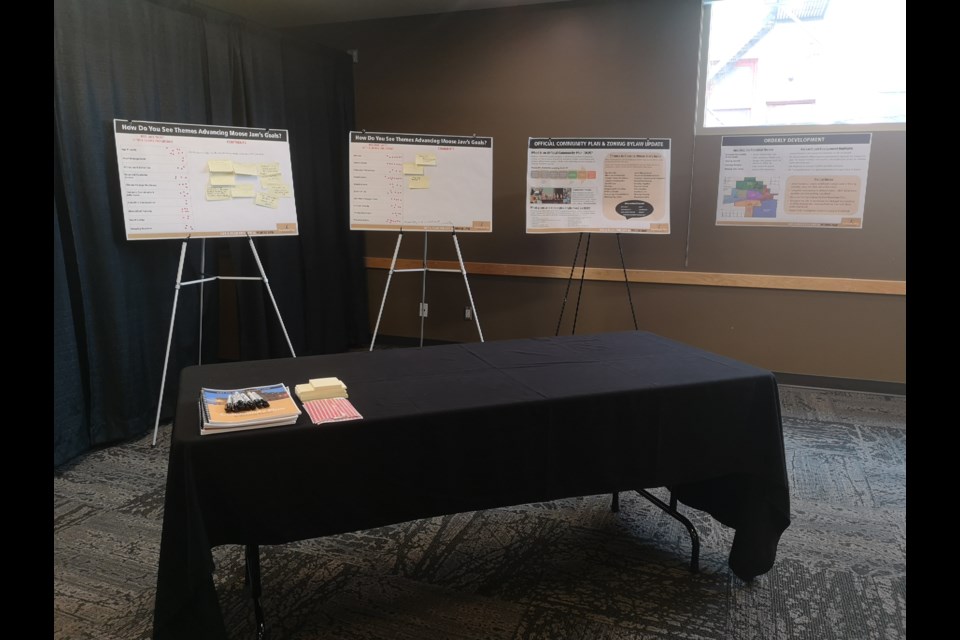The second and final community café took place Oct. 28 at the Moose Jaw Events Centre, thereby concluding Phase 2 of the Official Community Plan’s (OCP) revision process.
The café gave residents the opportunity to see what’s being considered, planned, and to give their feedback on these developments. To facilitate this engagement, the café was planned over two separate days to reach more community stakeholders.
“We’re at the end of the engagement period, so this is the second-to-last phase,” said Allan Wallace, planning director with Wallace Insights. The firm has been hired by the City of Moose Jaw to prepare and deliver the revised plan.
Wallace said he’s pleased with the feedback received so far, despite potentially reduced numbers in citizen engagement from recent weather conditions. The café had around 15 people attend on Thursday and similar numbers continued during Saturday’s event.
Areas being considered include transit, housing, and commercial development, with around 20 themes in total.
“I think what we’ve seen so far is really good feedback on transit. We hear a lot about transit, and how the reduction of that service has got to get fixed,” Wallace said. He also said a lot of focus is on commercial development, with areas in the west and southwest resembling a “retail desert.”
Moose Jaw’s historic downtown was also an area of high priority.
“Every visitor that comes to the city, the first impression they get is how wonderful your heritage Main Street is,” explained Wallace. Protecting Moose Jaw’s downtown asset is a major consideration in the plan.
To enable development in the downtown area, Wallace said infrastructure including water and sewage will need to be assessed and updated in some areas.
Now that the cafes have concluded, some time will be needed to explore recent feedback.
“Once we get those reactions, we’ll assess them, (and determine) whether they are feasible… Then we’ll take that forward to council and have a chat with them. We’ll tell them what we heard and how we summarized it,” explained Wallace.
Wallace said policies supported by city council must be supported with existing infrastructure, and no planning is worth exploring if accurate information is not provided.
“Our current OCP got adopted in 2011, so it’s about that time to update and reflect updated community values and what (residents) would like to see happen further with the city,” explained Raquel Wenarchuk, a development planner with the City of Moose Jaw.
The information boards reflected past consultations between February and April 2023. To facilitate public engagement, sticky notes were provided, and stakeholders had the opportunity to write down their concerns on any of the boards.
“(Feedback) is a shared effort. The feedback corresponds with each board that we have and covers different topics,” Wenarchuk explained. These areas include urban character, community, and natural spaces.
The City of Moose Jaw will continue to accept public feedback on all areas of development. “There’s always an opportunity to keep providing comments to us – we’re still open to any (suggestions),” Wenarchuk said. “If you’ve got comments and they’re bursting, please tell us.”
Christina McRorie represented Prairie Wild Consulting Co. at the community café.
“Prairie Wild is involved with the OCP planning (process) through a separate document called a Cultural Plan. The Cultural Plan integrates into the OCP through the OCP’s social and cultural development portion,” McRorie explained.
The Cultural Plan supports the achievement of social, cultural, and heritage goals, and seeks to discover what makes the city a place people want to live in. The plan entails a vision, goals, policies, and specific actions for the short, mid, and long term.
McRorie said there’s a lot of feedback concerning a local sense of community.
“(This entails) the opportunities for integration (and) getting to know each other, whether locals, newcomers, Indigenous communities, or working folks, and really wanting to ensure that fabric is tight knit.
“We’re also hearing a lot about opportunities for enterprise, whether arts enterprise, cultural enterprise, supporting local artists, and local efforts and initiatives in order to, again, create a place that has an active, vibrant culture that people want to come to and stay in,” she explained.
“The reason why cultural planning is so important is because the sense of culture in a place – by which we mean the heritage, the tangible assets, the arts, recreation, programming, and the sense of community – all of that contributes so much to the quality of life and the willingness to live in a place.”
Yet, because the Cultural Plan is not a stated requirement of the Planning and Development Act, it tends to be underappreciated and viewed as less significant.
“I think that once you begin to realize how imperative it is to think about culture and how much culture underpins… everything else, whether it’s the economic development in the tourism sector… or the sense of adhesion, integration, (and) health of the overall community, I think you begin to really see the value of cultural planning,” McRorie clarified.
In a system of democratic representation, community engagement requires a willingness for citizens to come out and voice their opinions.
“We want to hear everything that everyone has to say,” she said. “I do hope that, as we continue the process, more people are empowered to come out and share their thoughts.”
The online survey will continue for about one week and can be accessed at MooseJaw.ca/OCP.
To contact the city’s planning department, the email address is [email protected].
The OCP document should be prepared and submitted to city council by March of 2024.
In response to some providers blocking access to Canadian news on their platforms, our website, MooseJawToday.com will continue to be your source for hyper-local Moose Jaw news. Bookmark MooseJawToday.com and sign up for our free online newsletter to read the latest local developments.




